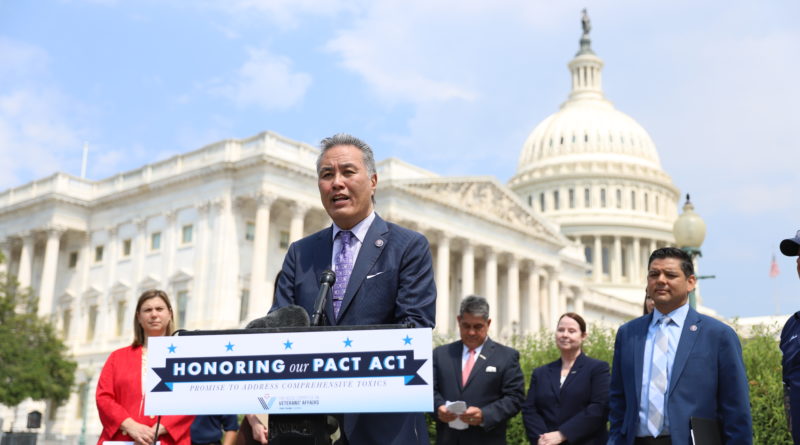It’s Time America Makes Good on Our Promise to Care For All Veterans
WASHINGTON, D.C. – Today, House Committee on Veterans’ Affairs Chairman Mark Takano (D-Calif.) held a Press Conference to unveil the Honoring Our Promise To Address Comprehensive Toxics Act Of 2021 or Honoring our PACT Act. Chairman Takano was joined by Committee Members Rep. Elaine Luria (D-Vir.), Rep. Raul Ruiz, M.D. (D-Calif.), and Rep. Elissa Slotkin (D-Mich.), advocates Jon Stewart and John Feal, and VSO leaders from the Veterans of Foreign Wars of the U.S., Disabled American Veterans, Iraq & Afghanistan Veterans of America, and Wounded Warrior Project. With this legislation, the Committee is one step closer towards fulfilling Chairman Takano’s commitment to Prioritize Toxic Exposure during the 117th Congress and Move Comprehensive Legislation Forward. Watch the press conference Here, and the bill text can be found Here.
Chairman Takano’s remarks as prepared:
Good morning! Today, I am so proud to unveil our new bill—the Honoring our Promise to Address Comprehensive Toxics Act of 2021 or the Honoring our PACT Act.
This bill is not mine alone, but the culmination of months and even years of work with my colleagues and our staffs. This comprehensive package covers every aspect of toxic exposures and is based on 15 bills from Members on both sides of the aisle. This has truly been a team effort based on legislation from Reps. Luria, Trone, Slotkin, Ruiz, Meng, Hayes, Cartwright, Harder, Pappas, Tonko, Stauber, Bost, Fitzpatrick, and Meijer. I am happy to be joined by my colleagues Reps. Luria, Slotkin, and Dr. Ruiz here today to talk about their provisions and am grateful our VSO leaders and advocates Jon Stewart and John Feal could make it as well.
Every day more and more veterans speak out about exposure to environmental hazards and other toxic substances during their military service. It’s led over 240,000 veterans to sign up for VA’s burn pit registry. However, with 70 percent of burn pit claims denied, it’s clear that VA’s process hasn’t been working. No veteran should be forced to prove that their government exposed them to toxic substances. Our bill fixes that.
This has been a long time coming. Last Congress, we took major strides and finally passed the Blue Water Navy Vietnam Veterans Act– but it took 40 years. I have great confidence in the new leadership President Biden has put in charge of VA, and I look forward to bold and decisive actions from Secretary McDonough to reorient how the agency addresses care and benefits for toxic exposure. But we cannot continue to tackle this topic one disability or exposure group at a time — we need to reform and overhaul the process within VA so that the agency can provide support to veterans without the need for continued congressional intervention.
That’s why we’re introducing the Honoring our PACT Act today.
Our bill will:
- Provide healthcare for potentially as many as 3.5 million veterans exposed to airborne hazards and burn pits
- Streamline VA’s review process
- Finally concede exposure to airborne hazards and burn pits
- Require medical exams and opinions
- Establish a presumption of service connection for 23 respiratory illnesses and cancers related to burn pits and airborne hazards exposure
- Create a presumption of exposure to radiation
- Expand Agent Orange exposure & add hypertension and MGUS to the list of presumptions
- Require VA provide standardized training & conduct outreach
- And improve data collection between VA & DOD and commission studies
There’s a reason it’s called the PACT Act. When we send our servicemembers into harm’s way, we do so with a promise to care for them when they come home. Toxic exposure is a cost of war. Our PACT Act finally recognizes that fact.
2021 will be the year we pass comprehensive legislation to meet the needs of all veterans– current and future– who are exposed to toxins while serving our country. It’s time America makes good on our promise to care for all veterans exposed to toxic substances.
Now, I’m pleased to introduce my good friend and Chair of our Subcommittee on Disability Assistance and Memorial Affairs, Elaine Luria.



